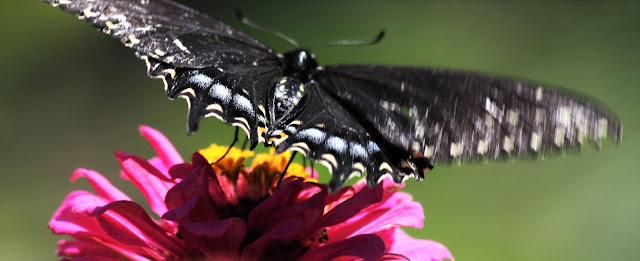And this, you have to believe, was one of the grandest moments of her life, the day that Dutch royalty--King and Queen--visited Grand Rapids, Michigan--and called on Berendina Eman, an occupation-era hero both here and in her native Holland. Together, they walked, arm in arm toward Meijer Gardens.
I remember asking her to explain to me, an American, this blessed fascination, this seeming idol-worship that she and other Europeans had toward their silly royalty. I didn't understand it.
She'd come to that moment in the story when the Queen had left occupied Holland for England, and she said the Queen's leaving made her furious. "She was our mother," Diet told me. I couldn't help but thinking such overwhelming affection for royalty was ridiculous. "She was our mother and she'd left us behind," she said.
But soon enough she said her countrymen and women learned that their Mother's leaving was for the best because she could much better lead, play the role she'd gained when she wore the crown, if she were away from the Nazis, safe in England.
The roles seems reversed in the photograph, don't they? King William Alexander and Queen Maxima, hold tight to Diet as if she were their mother. What they know is that, given her role during the war, she was--and is. And Diet?--I swear I could hear her joyful heart three states away.
Tonight, we start rehearsing "Things We Couldn't Say," a readers theater presentation of the book of the same name, the biography of Diet Eman. I wrote them both a quarter century ago at a time when the world was looking back fifty years to commemorate something never to be forgotten, World War II--both it's horrors, Hitler's "final solution," and its joys, unimaginably selfless heroism
"Things" first played in public at a small conference of a AADAS, a Dutch-American historical group, who staged it in the Fine Arts Center of what was then Calvin University, in Grand Rapids, MI. I don't remember how it had happened, but somehow the word got out and Diet already had a presence among many locals. Shockingly, at least to me, the place was full.
Writing, my old friend Fred Manfred used to say, requires listening to your "IC," your "internal commentator," the voice that emits unsparing truth unfettered by custom or reputation. Every good writer has to listen to his "IC" if he or she is going to write, Manfred used to say. It's an inner voice that won't be bothered by conscience or political correctness. Whether or not that voice speaks in the writing is of no great importance, but it must operate in the way information--in this case, a woman's war-time experience--is heard or experienced or regarded.
I say that because when I remember the very first performance of the readers theater version of Things We Couldn't Say, what I remember best was being blind-sided afterward, because Diet herself was an emotional wreck, tears abounding.
I assumed those tears were drawn from the success of the production--a full house, a standing ovation for her, unending lines of people wanting to shake her hand, to hug her.
But that wasn't it. She was broken by a public rehearsal of a life she'd only rarely spoken of, a life--and a death--she'd suffered during the war fifty years before, in a campaign she fought herself so valiantly in the renegade Dutch Resistance. And she'd suffered--two concentration camps, a dangerous hearing, the death of the man she loved more than almost anything.
When she had told me her story--it took a week of interviewing--she'd opened up all of that in a way she never had before. I'd taken it all in, worked on putting it all together chronologically, tried to keep her voice in telling it, then spun it out in a manuscript that was not yet published, as well as this readers theater presentation we debuted that night in a sizeable recital hall full of people.
What she saw and heard before her that night was a portrayal of what she'd not regarded as secret, but something so heavy with emotions that it had always been hugely unexplainable. She'd left so much of her heart behind in those war years that when it replayed in front of her, the intimacy of her experience was on display as it had never had been before. She told me, in tears, she'd cried all the way through because the intimacies of her life were vividly on display.
The IC in me loved the story and wanted, like nothing else, to tell it, to share it, to make others see the immensity of her suffering and her immense faith in the God she and her fiancé worshipped. It was for His dear sake that they'd taken on the resistance work, after all. But I'd never considered what the experience might do to her. My IC was operating full-strength, my conscience had left the building, never even made an appearance.
She was angry with me because she couldn't help feeling this writer she'd come to know was playing with her, just putting on a play.
Her life matters--all lives do. They require more.
She's gone now, died a year ago, just a stone's throw from 100 years old. This performance will be the first time she's not around.
I have a small part, maybe a half-dozen lines, because the play is a dramatization of what I experienced when she told me the story of her life. And when I watch the story unfold once again myself, as I've done dozens of times before, I'll still see her cowering somewhere out there in crowd, as emotionally fragile as she was that first night she saw herself and her fiancé and listened to someone else tell her story to full house in front of them.
She'll be there, royalty herself, and I'll remember all those tears many years ago.
































